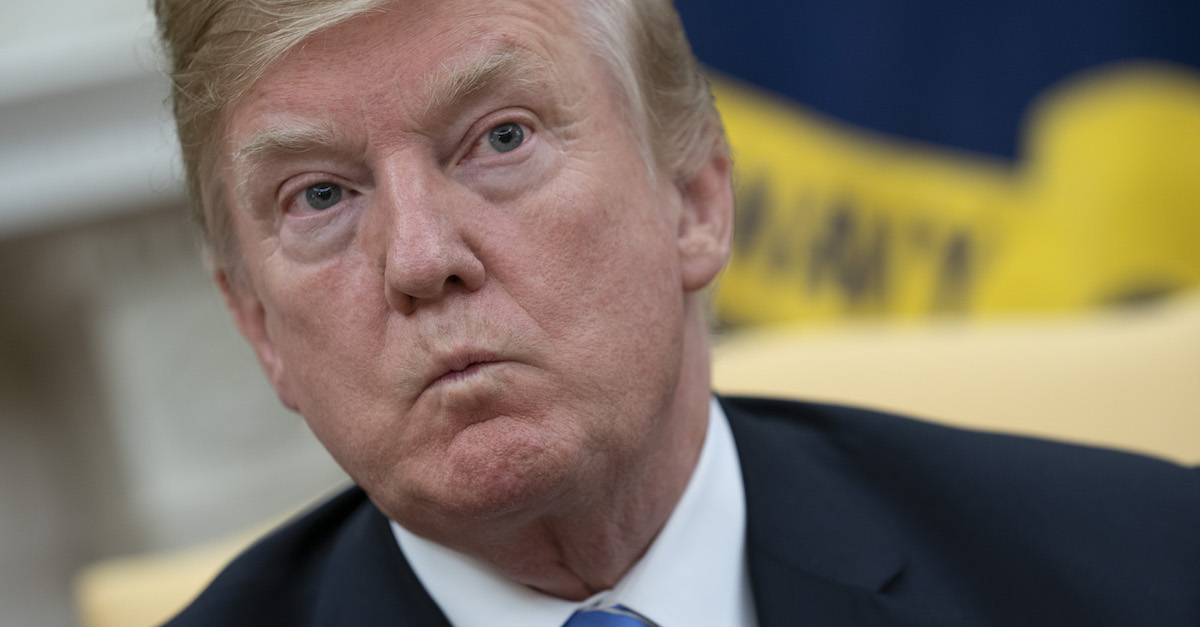
President Donald Trump‘s attorneys let it be known on Monday that they were not pleased that a federal judge had decided to fast-track a fight over the House Oversight Committee’s subpoena of Trump’s finance firm Mazars USA. Despite that, Judge Amit Mehta ordered that the scheduled hearing would occur on Tuesday as planned, noting that he would take up Team Trump’s “objections.”
Here’s what happened.
Mehta will not be ruling from the bench today, he says straight away, contrary to media reports implying as such. The issues presented today are serious, Mehta says. “No judge would make a hasty decision on such important issues for the sake of expediency.”
— Britain Eakin (@BritainEakin) May 14, 2019
Right out of the gate, Mehta noted that he would not be ruling on anything Tuesday, saying “No judge would make a hasty decision on such important issues for the sake of expediency.” At the same time, Mehta was clear on another point: “We’re not dragging this out.”
The debate in the courtroom on Tuesday was this: is the subpoena “political” or was it issued with a “legitimate legislative purpose.” Trump lawyers have argued that it is both political and not for a legitimate legislative purpose.
“They want to know if there was wrongdoing,” Trump lawyer William Consovoy said.
But this argument doesn’t appear to have gone over particularly well with Judge Mehta. Mehta asked Consovoy if he believed Congress didn’t have the authority to launch investigations into Watergate and Whitewater. Consovoy reportedly replied, “I’d have to look at the basis.”
Mehta asked Consovoy another question.
“Say for example if a president had a financial interest in a particular piece of legislation that was being considered […] in your view Congress could not investigate whether a president has a conflict of interest?” he asked.
“It would lack legitimate legislative purpose,” Consovoy answered.
Mehta also asked if it was correct that there hasn’t been a case since 1880 in Kilbourn v. Thompson in which Congress was found to have issued an unlawful subpoena. Consovoy acknowledged that the judge was right.
House Democrats’ counsel Douglas Letter, whose experience has been well-documented, said the the problem with Trump is that he views Congress as a “nuisance,” which is a “total and basic and fundamental misunderstanding of the system that was set up by the Constitution.”
Letter also asked Mehta not to let this case drag out.
“This Congress is limited in time. There’s obviously going to be appeals here. We just do not want there to be any lag in time,” he said. “Any delay here undermines the House’s ability to do what the Constitution allows it to do.”
Mehta did acknowledge in one exchange that the lack of definition of Democrats investigation “really does open the door” to allegations that this is “political,” whether that is “valid or not.”
At the same time, Mehta pointed out that he “can’t look to Congress’ motives.” Letter also mentioned this.
Little urges the court to go ahead and consolidate and rule on the merits. “There is only a legal issue here. There’s no discovery that is either possible or relevant.” SCOTUS precedent prevents the judge from looking at motive, he adds. “We think it should be decided quickly.”
— Britain Eakin (@BritainEakin) May 14, 2019
“There is only a legal issue here. There’s no discovery that is either possible or relevant,” Letter argued. “We think it should be decided quickly.”
CNN legal analyst and attorney Ross Garber told Law&Crime that the Trump attorneys appeared to struggle with some of their answers.
“The limits of Congress’s authority to demand information implicates important constitutional issues that courts rarely decide,” Garber said. “For at least some of the judge’s questions, Trump lawyers didn’t have great answers.”
And that’s all for now, folks.
Mehta will reportedly allow both sides to submit additional evidence until May 18.
Additional Context
If you were paying attention last Thursday afternoon, May 9, Judge Mehta entered an order revealing that it was his plan to fast-track Trump’s attempt to stop Mazars USA from complying with a congressional subpoena from the House Oversight Committee. Mehta said he was “notifying the parties that the court intends to advance Plaintiffs’ Motion for Preliminary Injunction to trial on the merits” and consolidate issues into a hearing because the court “can discern no benefit from an additional round of legal arguments.”
Trump lawyers wanted no part of that and said so before the hearing. They said that they “respectfully oppose[d] consolidation” because consolidation “on such short notice […] would undermine Plaintiffs’ constitutional due-process rights.”
The House Oversight Committee subpoenaed Mazars USA for Trump’s financial documents, including “Statements of Financial Condition.” During a recent congressional hearing, former Trump lawyer Michael Cohen stated that Trump would use these statements to exaggerate the value of his assets. He would allegedly due so by inflating the number of residential units in properties and the number of floors in towers he owned. Democrats are looking into this to see if any of these alleged misrepresentations were criminal in nature. Trump had previously put Mazars USA “on notice,” saying that legal action could come if they complied with a subpoena.
Trump has alleged that the subpoena was issued “with the hope that it will turn up something that Democrats can use as a political tool against the President now and in the 2020 election.” Trump lawyers called the subpoena a “weapon of choice” for House Democrats in their “all-out political war against President Donald J. Trump.”
[Image via Chris Kleponis-Pool/Getty Images]
Have a tip we should know? [email protected]